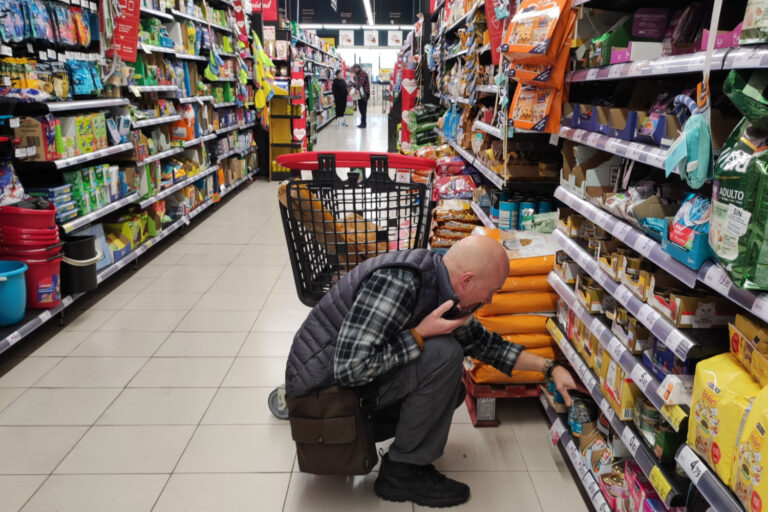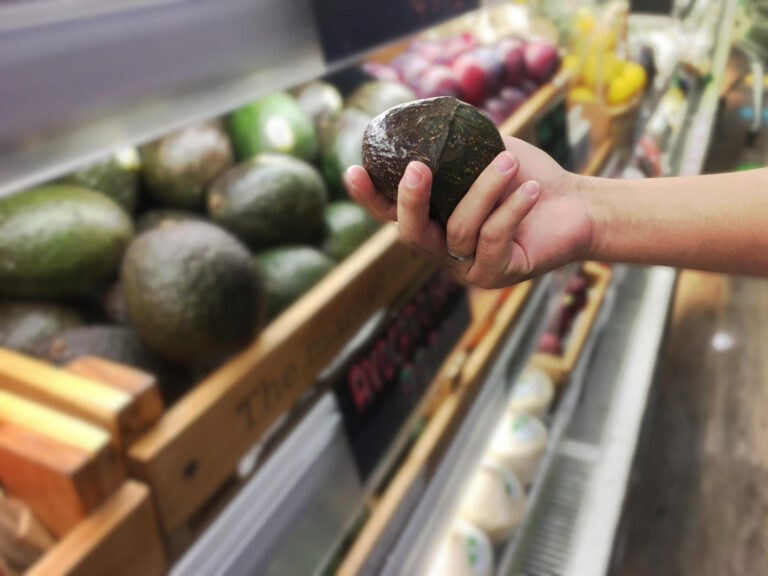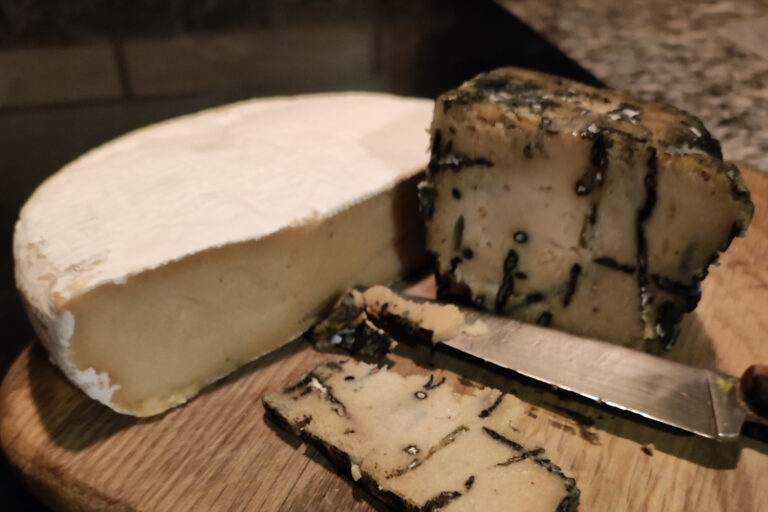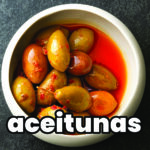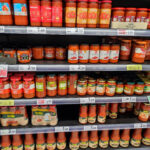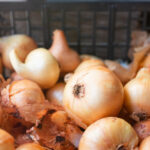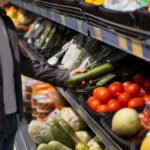The Best Fluffy Pancakes recipe you will fall in love with. Full of tips and tricks to help you make the best pancakes.
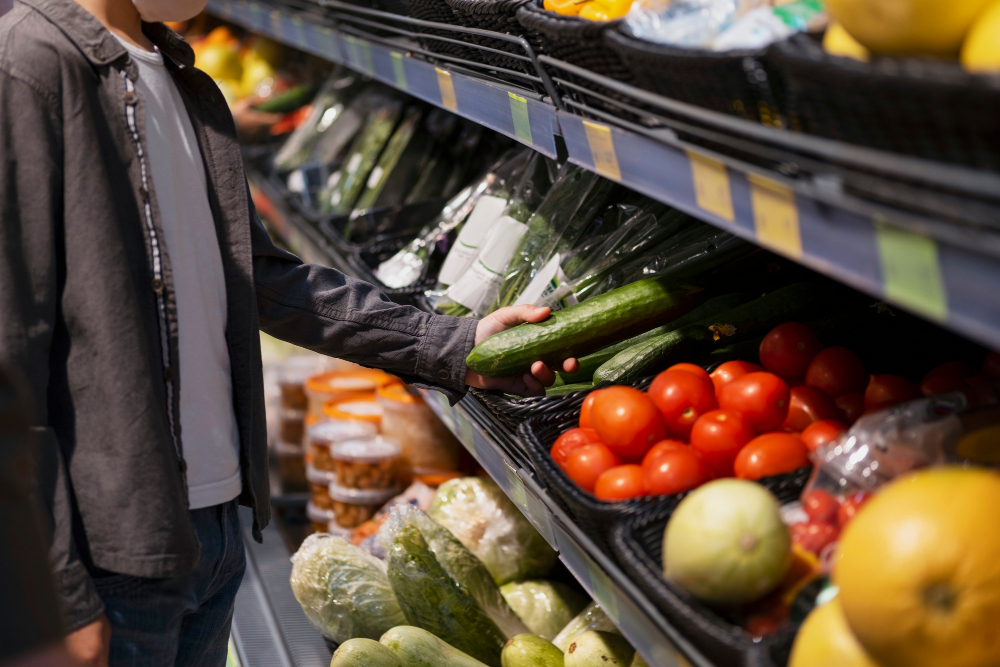
Yey – you’re planning a visit to Spain 🙂 AND you’re planning on staying at least a couple of nights in self catering accommodation. It doesn’t get a lot better than that – you have the freedom to create your own vegetarian and vegan meals using all the rich goodness in ingredients readily available. However, if this is your first time shopping for vegetarian and vegan food ingredients in Spain it can be a little challenging outside of the big cities and mega tourist hubs.
In this post we’re going to share with you all the info you need to navigate supermarkets, specialty shops, and local markets with confidence. We’ve also included specific tips for avoiding meat products and finding fresh, delicious ingredients for your meals.
Buying and Cooking Vegetarian Food in Spain
If you are staying in Spain, either in self catering accommodation, whether an AirBnB, campervan or apartment, the chances are a trip to the shops will be necessary to stock up on food, particularly if you are vegetarian or vegan and planning on cooking your own vegetarian and vegan food while in Spain.
Careful planning and purchase of food from supermarkets, markets and stores can help you purchase not only the best possible products and ingredients to prepare easy-to-cook food during your stay but can also help you avoid the mishaps which can await the unsuspecting vegetarian shopper 🙂
Happily, there are plenty of options, and we’ll help you successfully shop for vegetarian food and shop for ingredients to cook your own vegetarian food in Spain
Vegetarian Food in Spain
While the big cities and areas developed by international tourist companies are likely to have wide selections of vegetarian and vegan food, get off the beaten track and it’s not so easy.
I know! As a vegetarian living in Spain since 2005, I am very familiar with the challenges of finding vegetarian food! However, that means I am an expert when it comes to both shopping for vegetarian and vegan ingredients and cooking vegetarian and vegan food at home. Yep, lemons to limonada.
Spanish Supermarkets – What to Expect
So… the first place you are probably going to start is a Spanish supermarket – of which there are plenty to choose from!
Supermarkets are a great place to do your food shop when visiting Spain. While wandering around the specialist stores and markets are a great way to get a sense of real Spain, you’re at the very least likely to want to stock up on some staples and commodity items and a quick visit to a supermarket will have you covered.
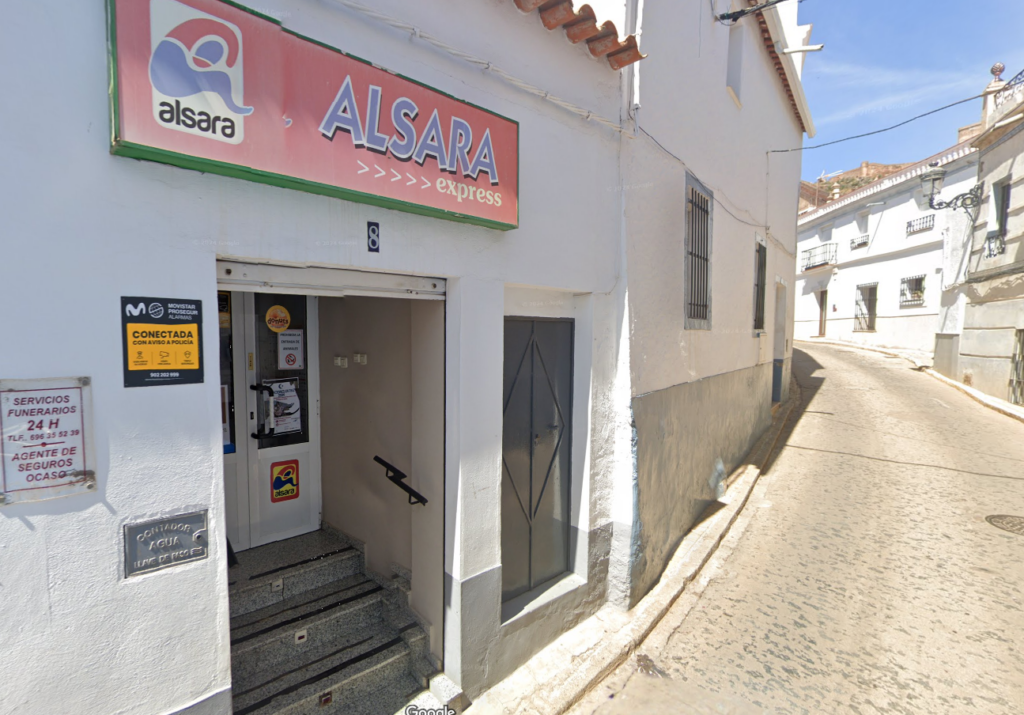
Like most places, Spain has a wide selection of supermarkets ranging from small family owned stores in village centres through to large out-of-town hypermarkets.
In the smaller supermarkets you may be hard pressed to find a wide selection of vegetarian or vegan ready made or prepared meals. In the larger supermarkets you will find a better choice. However, this may be very different to what you are used to at home.
For example, even a large supermarket may have a vegetarian / vegan section comprising of just a handful of products. You’ll also find that many vegetarian foods aren’t labelled as such. In UK supermarkets, for example, a tin of ratatouille is likely to be labelled as being vegetarian and vegan. There isn’t a universal standard for the labelling of vegetarian and vegan products in Spain so it really is a case of reading the labels! For example, sofrito is always made with vegetables and vegetable oil and suitable for vegetarians and vegans – but it is rarely labelled as such.
Main Supermarket Chains in Spain
You’ll find large chains such as Mercadona, Carrefour, Dia Alcampo, Lidl, and Aldi. They usually have a good fresh fruit and vegetable section (Frutas y verduras), legumes (Legumbres), plant-based milk alternatives, and increasingly, processed vegan products (larger stores/big cities).
Key sections in supermarkets: In addition to the chilled food in refrigerators where you will find chilled ready-to-cook pizza, pasta, hummus etc, look for the “Bakery” (Panadería) where many supermarkets offer fresh in-house baked bread in a variety of forms, “Fruits and vegetables” (Frutas y verduras), “Legumes” (Legumbres), “Dairy” (Lácteos) (where you’ll find plant-based alternatives), “Frozen” (Congelados) (for vegetables and sometimes meat alternatives), “International” (Internacional) where you may find some vegetarian foods and the “Herbalist/Dietetics” (Herbolario/Dietética) section (where there are sometimes specific vegan products).

Look for labels such as “vegano” (vegan) or “apto para vegetarianos” (suitable for vegetarians). Note: Many supermarkets will have customer service people who may be prepared to help you – however this depends on the supermarket.
Tip: Have a euro coin available as many supermarkets have a trolley deposit system. Also, bring your own bags with you or be prepared to pay a few centimos at checkout for a bag or two to carry your shopping.
Buying Food in Spanish Markets (Mercados)
Most Spanish towns and cities will have at least a weekly market. Larger towns may have permanent markets (Mercados municipales), perhaps dedicated to a specific food type, for example a vegetable market or fish market. These may well be undercover with permanent stalls.
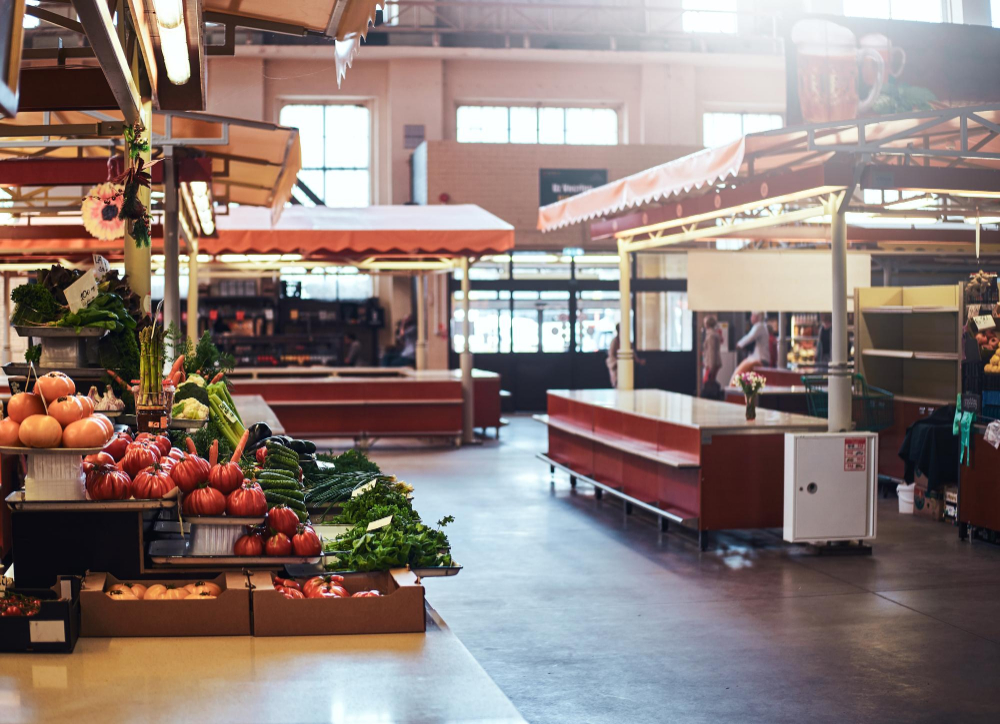
Small villages may have a weekly market that replaces a village shop in terms of ‘commodity’ items. You may not find a wide selection of things here, but you will find the basics
It’s common in markets to ask for what you want (pointing and smiling also works!). Keep a look out for signs saying ‘no tocar’ (don’t touch). Stall holders generally don’t welcome over fondling of their goods 🙂
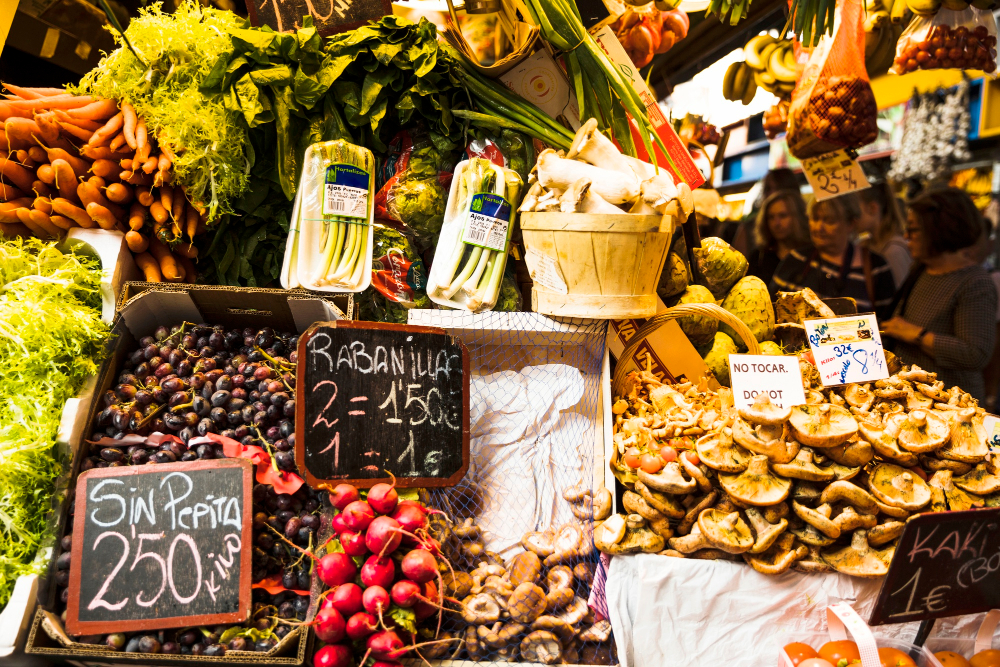
Speciality Shops
You will find many stores selling specific products. These can be a great way to discover some typical Spanish items.
- Fruit and Vegetable Shops (Fruterías/Verdulerías): These are shops dedicated exclusively to fresh fruits and vegetables. The quality is usually high, and it’s a good place to find local and seasonal products.
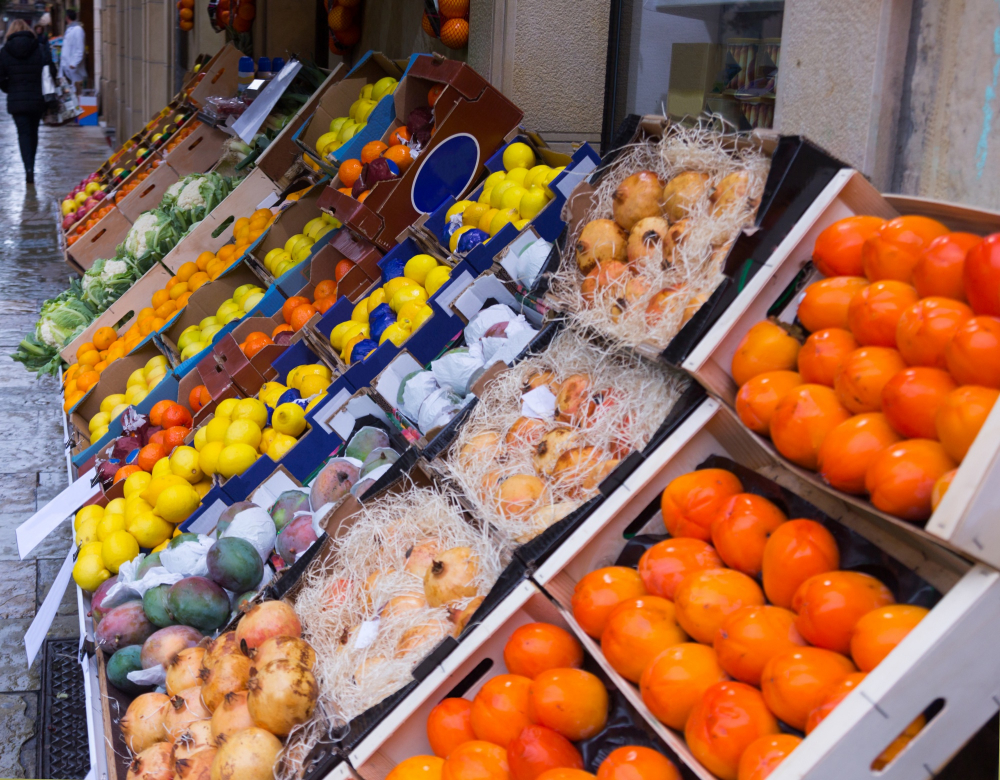
- Bakeries/Ovens (Panaderías/Horno): In addition to bread (Pan), many bakeries offer other products such as empanadas (a sort of pasty). Be aware that some pastry items are still cooked using pig fat (manteca de cerdo), particularly traditional bakers and some items may appear vegetarian but contain animal fat.
- Herbalists/Organic Shops (Herbolarios/Tiendas ecológicas): Here you will find organic, wholefoods, supplements, and often a selection of vegan products, such as seitan, tempeh, etc.
- Municipal Markets (Mercados municipales): These are an excellent option for finding fresh, local, and seasonal products. The atmosphere is also very authentic.
Tip: In small stores, it’s polite to greet the shopkeeper upon entering with a simple “Hola” or “Buenos días”/“Buenas tardes” depending on the time of day. When leaving, a friendly “Gracias” or “Hasta luego” is appreciated. You are also likely to be greeted by other shoppers, so don’t be surprised when complete strangers greet you with a smile and welcome.
Avoid carnicerías (butcher shops). While many have a wide range which includes cheese and perhaps some local products, they offer very little for the vegetarian shopper other than a grim display of animal parts providing a reminder of why we’ve embraced the vegetarian lifestyle.
Useful Vocabulary for Shopping In Small Shops
Can you serve me, please?
- ¿Me puede atender, por favor?
- ¿Me puede servir, por favor?
Can you help me, please?
- ¿Me puede ayudar, por favor?
I would like [item], please.
- Quisiera [item], por favor.
- Quiero [item], por favor.
Do I serve myself?
- ¿Me sirvo yo mismo/misma?
- ¿Es autoservicio?
Can I pick the [item] myself?
- ¿Puedo escoger/seleccionar [el/la item] yo mismo/misma?
Where are the bags?
- ¿Dónde están las bolsas?
Can you weigh this for me?
- ¿Me puede pesar esto, por favor?
Can you give me [amount] of [item]?
- ¿Me puede dar [cantidad] de [item]?
Can you recommend something?
- ¿Me puede recomendar algo?
Do you have…?
- ¿Tiene…?
How much does it cost?
- ¿Cuánto cuesta?
- ¿Cuánto es?
I’ll take this one, please.
- Me llevo este/esta, por favor.
Do you have change for a [bill/coin amount]?
- ¿Tiene cambio para un [billete/moneda de cantidad]?
What time do you open/close?
- ¿A qué hora abren/cierran?
Shopping Off the Beaten Track in Small Villages
Shopping in small villages can be quite the adventure! Not all shops have signage outside indicating what they sell – or even that they are a store! The window displays will provide the clue.
Most small villages will have some form of supermarket or store and there are likely to be vans which service the area selling products. For example, a baker doing the rounds daily. You will hear the horns honking or see them parked up with people queuing around the doors.
Be aware of siesta time, particlarly in the south of Spain. In rural areas, is not uncommon for shops and smaller supermarkets to shut during siesta time, which can be between 2 & 5 or even 6 in the afternoons.
While you will find some wonderful local foods in small villages – the freshest of vegetables, artisan cheeses, small-batch wines etc, it may be challenging to find vegetarian food. As above, watch out for pastry containing pig fat, tortillas cooked in animal fat, vegetables cooked in a meat stock…
Tip: Finding vegetarian prepared food in small villages in rural Spain may be tricky – however finding the ingredients for a wonderful picnic will be very easy. Grab some crusty bread, fresh tomatoes, a chunk of tasty cheese and head to a Merendero or Área de descanso for your very own taste of Spain.
Learn to Read Labels!
It’s not ‘that’ difficult to read the ingredients labels in Spain. Spain is part of Europe and conforms to food labelling legislation common throughout European countries. Read more about how to read labels HERE!
Use an app on your phone to translate the text – or just look out for things like:
- Manteca de cerdo – Lard (pork fat often used in baked goods like pastries or empanadas)
- Grasa animal – Animal fat (general term)
- Caldo de carne/pollo – Meat or chicken broth
- Gelatina – Gelatin (often made from animal collagen)
- Cuajo – Rennet (used in cheese production, not vegetarian unless specified)
- Anchoas – Anchovies (commonly used in sauces or garnishes)
- Morcón – Another type of cured sausage, similar to chorizo
Tip: Remember – this is Spain. What you know at home may not be the same here 🙂
This is an example of things to watch for. This looks like it could be similar to baked beans and perfect for adding to a slice or two of toast – however look at the ingredients. This contains pig fat. The brand Litoral does make vegetarian products (look for their Vegetal range) – but this isn’t one of them.
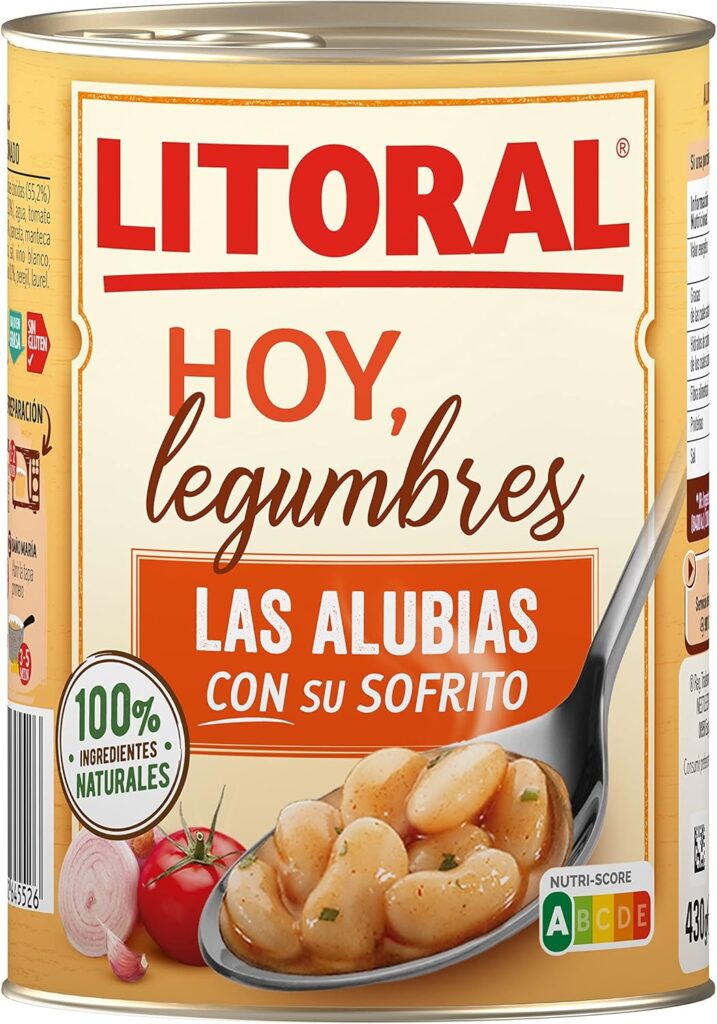
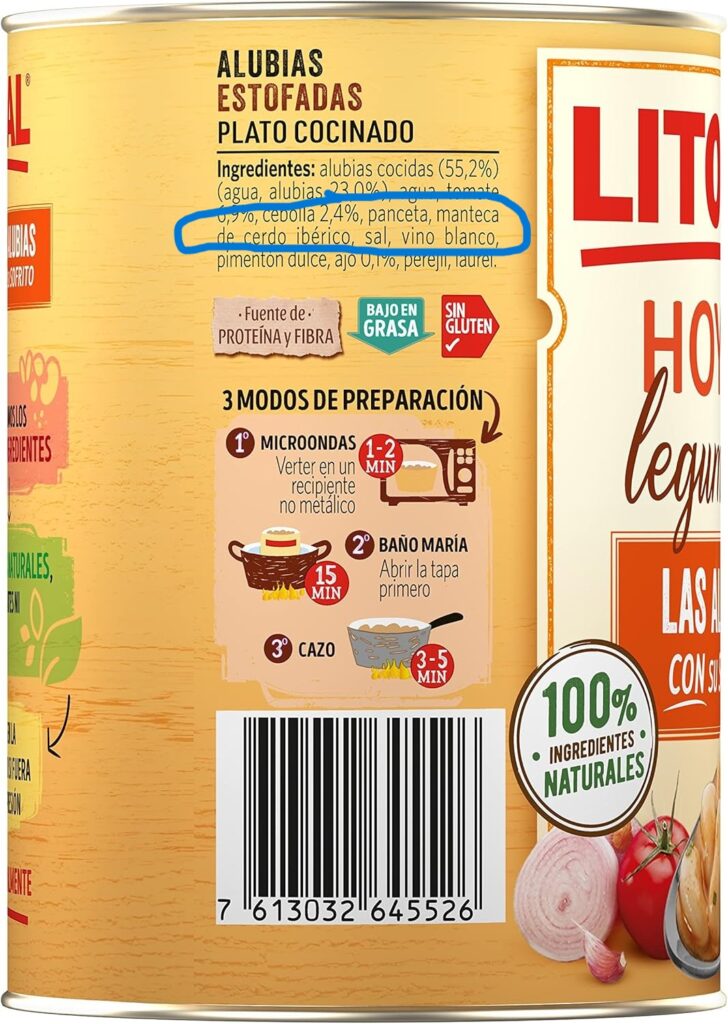
Useful Vocabulary for Vegetarians and Vegans When Shopping In Spain
Here are a few terms which may be useful.
- “¿Tienes algo adecuado para vegetarianos / veganos?” – Is this suitable for vegetarians / vegans?
- “¿Esta masa está hecha con grasa vegetal?” – “Is this pastry made with vegetable fat?”
- “¿Tiene algo sin carne/pescado?” – “Do you have anything without meat/fish?”
- “¿Esto lleva jamón/chorizo?” – “Does this contain ham/chorizo?” (Many dishes include cured meats even if it’s not obvious.)
- “Solo como verduras y frutas, ¿qué me recomienda?” – “I only eat vegetables and fruits, what do you recommend?”
Hopefully this will help you find wonderful food to create your own special meals when visiting Spain and make your food shopping trip stress free.
Do you have any tips for food shopping and cooking vegetarian and vegan food in Spain? Particularly experiences off the beaten track?
Do share below – we love to hear your thoughts 🙂


